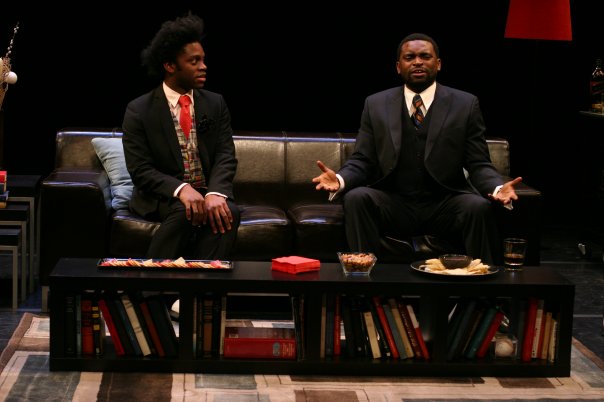THE SHIPMENT: Something’s lost in translation
Translated from German by Goesta Struve-Dencher and Henning Bochert
As part of a European tour following its extraordinarily successful run in New York earlier this year, Young Jean Lee’s play The Shipment was recently presented by the HAU Theater in Berlin. The production, directed by the author and performed at the Hebbel Theater, had just come from engagements in Paris, and it would subsequently play in Hamburg.
For my part, I was seriously impressed by the exacting composition and the profound dramaturgy of this work, as well as by the marvelous acting in it. At the same time, it struck me that, despite its obvious ambitiousness and depth, the production did not read well for a German audience, largely because of the way its provocations were specifically designed for a U.S. audience.
The Shipment subverts American perceptual habits. We witness an evening in four parts: an introductory dance; a solo entertainer performing a massive monologue; a sort of comic-strip biographical sketch in high-speed time-lapse; and finally a short social drama with a twist. After the New York opening, a reviewer for The New York Times wrote: “The show is provocative but never polemical, and it is pleasingly eclectic.” Here I would like to offer my response as a German spectator who necessarily has different reactions to both the provocations and the pleasures.
While I did not feel significantly affected emotionally after the show, the evening appears more complex as I think about it more closely. I also perceived a fundamental question — and a fundamental problem — in exporting this work to non-American countries. The performance aims at undermining the audience’s deeply ingrained prejudicial modes of seeing. Each of the four parts addresses discriminatory perceptions, of which no one can be free, and it is the necessary labor of a meaningful Sisyphus to point them out time and again. The problem with performing such a labor beyond the borders of one’s culture is that perceptions of discriminatory perceptions are necessarily very different there.
Anyone expecting a dialogue-based play focusing on racism is unsettled right off the bat in The Shipment by the virtuosic opening dance. The choreography quotes elements of the minstrel-show, a specifically American form of entertainment that began in the 19th century and remained popular until the final abolition of the Jim Crow laws in 1964: white entertainers painted their faces black and danced a caricature of black people and their alleged ridiculous characteristics. Not even the music in these shows was really of African-American origin. Yet paradoxically, black actors eventually participated in them. The exploitative minstrel shows provided a loophole in the performing restrictions for black entertainers, and audiences would often not even notice that the skin under the black paint was actually dark. It is hard to imagine how humiliating this occupation would have been.
We can assume that a U.S. audience would be as sensitive to quotations from the minstrel form, even though it is old history, as a German audience would be to the tone of anti-Jewish forms of entertainment. Most German audience members do not know much about minstrelsy, however, and without this essential information, all they may see is a beautiful dance.
The next part of The Shipment is one big transgression of racial taboos: the actor Douglas Scott Streater inundates us with black-and-white jokes in stand-up comedy format. He speaks of babies slaughtered, incest propagated, and runs the gamut of scatological language from anal sex to sex with animals. He admits that he would not talk like this offstage but he’s too afraid of his peers’ reactions to abandon his role. During his first sentences, the actor addresses his audience regarding the ethnic minorities at the respective site of the performance. Every place has its own blacks, he opines: it’s just that in Berlin they’d be called Turks.
Now, both jokes and taboos are culturally very delicately positioned and not easily transposed by just briefly calling upon the most visible ethnic minority at the respective city of performance in this way: Tamils in Zürich, Turks in Berlin, Arabs in Paris. The issues involved are too specific in each case, and if Tamils in Switzerland are differently positioned in society than Turks in Berlin, then there is certainly a significant difference between both those groups and African-Americans in the United States. The Turks in Berlin, for example, are first, second or already third generation immigrants from the post-war economic boom (Wirtschaftswunder) of the 1960s, when Germany was in urgent need of workers for its flourishing industry. During that time, Greeks and Italians were invited to work in Germany as well, as Gastarbeiter, or guest workers. A comparison with African-Americans in the U.S., whose ancestors were forcibly relocated as cargo, glosses over the atrocities of the slave trade and the racial divide embedded in that country since then. Perhaps this point could be clarified by reflecting on how specious it would be to equate the particular social issues facing African-Americans with those of contemporary Mexican immigrant workers in the U.S.
Young Jean Lee no doubt felt she was directing her local audiences’ attention towards their own racial prejudices and patterns of thinking. My feeling, however, is that for the purpose of a differentiated view, the show’s specificity is just what should not be sacrificed. The production is calibrated to a U.S. audience with the most extreme exactitude. Running the risk of getting caught in the first net laid out by the dramaturgy, I consider the decision to superimpose local problems at the tour’s performance sites imprecise.
Part three of The Shipment is Omar’s story, an extremely amusing narrative cliché of an underprivileged African-American’s life. We learn of Omar’s dream of becoming a rap star, his drug career, his jail time. A few friends die, and in the end he regrets his ugly life. The acting here is an impressive translation of the South Park style to the stage. Obviously the audience gets caught up in this surprising treatment. But the matter unfortunately isn’t left there. A very long, patronizing silence follows the scene, of the kind one employs with children, waiting out their tantrums with a patient, meaningful look. After the show, an actress told me that this was exactly the way it was meant. It was supposed to make us feel uncomfortable, and that expectation felt awkward. Eventually, marvelously, the a cappella trio in the scene broke the silence with a song by Modest Mouse. The precision of that cut like a knife.

By this point in the play, the audience was clearly tuned to the theme at hand. As a Caucasian, I would have been too uptight by now to talk to any Turk, Iranian, Tamil, Algerian, Senegalese or African-American about what I was seeing. Then came the longest, fourth part of the show, the main attraction: a birthday party at Thomas’s. This section involves a mini-play about a host who is acting strangely, pitting his guests against each other. “I have poisoned us all,” he claims, after which everybody becomes frantic and an ambulance is called. Later it all turns out to be a bad joke. Thomas is so lonely that he brutally dupes his friends and, along with them, us.
The friends play a game to relax, a few not-so-funny jokes are made about African-Americans, everyday racism. Omar is not comfortable with that. “I really don’t think we would be doing this if there were a black person in the room,” he says. “I guess that would depend on what kind of black person it was,” quips Desmond. Bang, lights out. The End.
Now the audience ought to do a double take and realize, oh wow, those were all white characters being played by the black cast. I suspect that most of the Berlin audience, however, missed this twist either for acoustic reasons or because they were busily scanning back and forth between actors and supertitles. The question remains whether the U.S. audience would have caught on before the final revelation. In any case, because the black-white theme is less prevalent in German society, we tend to perceive (or would like to think we do) social class before skin color in such a setting, so we may not have the prerequisites to decipher these racial behavioral stereotypes at all. What we see are well-situated, very well-dressed people, who act and speak much like the characters in the TV serials imported from the USA.
This play is a racism mouse-trap, minutely and magnificently constructed, and it should be no surprise that it ensnares differently in different places. It was certainly less effective with a European audience, and under the conditions of a foreign-language guest performance, than it no doubt was in Columbus, Ohio, or New York City. I was looking forward to asking about its various subtleties, and about the cultural differences just described, during a post-show talk with the cast and Ms. Lee at the Hebbel. Unfortunately, such a talk was not scheduled. Which was too bad, because this production urgently required mediation under the circumstances in Berlin. The translation alone was unable to convey both the fine web of its thematic fabric and the powerful impact of its delivery.
published on www.hotreview.org


Leave a Reply